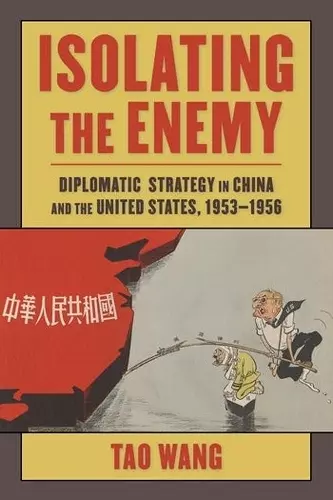Isolating the Enemy
Diplomatic Strategy in China and the United States, 1953–1956
Format:Hardback
Publisher:Columbia University Press
Published:17th Sep '21
Currently unavailable, and unfortunately no date known when it will be back

In the crucial moment after the Korean War, the United States and the People’s Republic of China circled each other warily. They shifted between confrontation and conciliation, ratcheting up tension yet also embarking on peace initiatives.
Tao Wang offers a new account of Sino–American relations in the mid-1950s that situates the two great powers in their international context. He reveals how both the United States and China adopted a policy of attempting to isolate their adversary and explores how Chinese and American leaders perceived and reacted to each other’s strategies. Although the policy of the Eisenhower administration was to contain China, Washington often overestimated Chinese aggressiveness, worrying allies and neutral states. Sensitive to the differences within the Western camp, Chinese leaders sought to convince American allies to persuade the United States to back down. Wang analyzes diplomatic maneuvering over a peace settlement in Indochina, an American defense pact with Taiwan, and the anticolonial Bandung Conference, showing how political pressure pushed American leaders to make concessions. He challenges the portrayal of Communist states as driven by ideology, showing that Chinese leaders adopted a pragmatic policy during these crucial years.
Drawing on Chinese, Taiwanese, Russian, Vietnamese, British, and American archival material, including reclassified Chinese Foreign Ministry documents, Isolating the Enemy offers new insight into Chinese diplomacy in the 1950s and U.S. foreign policy under the Eisenhower administration through a nuanced portrayal of Sino–American interactions.
In this richly detailed and sharply focused study, Tao Wang sheds new light on Sino-American relations between 1953 and 1956. The contradictory tendencies in U.S. and Chinese policies that he identifies are highly relevant for anyone who wishes to understand the complex relationship between Washington and Beijing of today. -- Gregg Brazinsky, author of Winning the Third World: Sino-American Rivalry during the Cold War
Drawing on a wealth of declassified archival materials from the United States, China, and other countries to provide a meticulous, nuanced account of the crises and upheavals in U.S.-China relations in the first few years after the Korean War, Tao Wang offers an excellent overview of the fluctuations in U.S.-China relations in the mid-1950s and how the two countries managed to avoid going to war even in times of great hostility and tension. -- Mark Kramer, director of the Cold War Studies Project at Harvard University
Methodically researched, clearly argued, strongly supported, and well written, Isolating the Enemy greatly enhances our understanding of the U.S.-China interactions in the mid-1950s and makes significant contributions to the study of Cold War history. -- Hongshan Li, author of U.S.-China Educational Exchange: State, Society, and Intercultural Relations, 1905–1950
ISBN: 9780231198165
Dimensions: unknown
Weight: unknown
336 pages